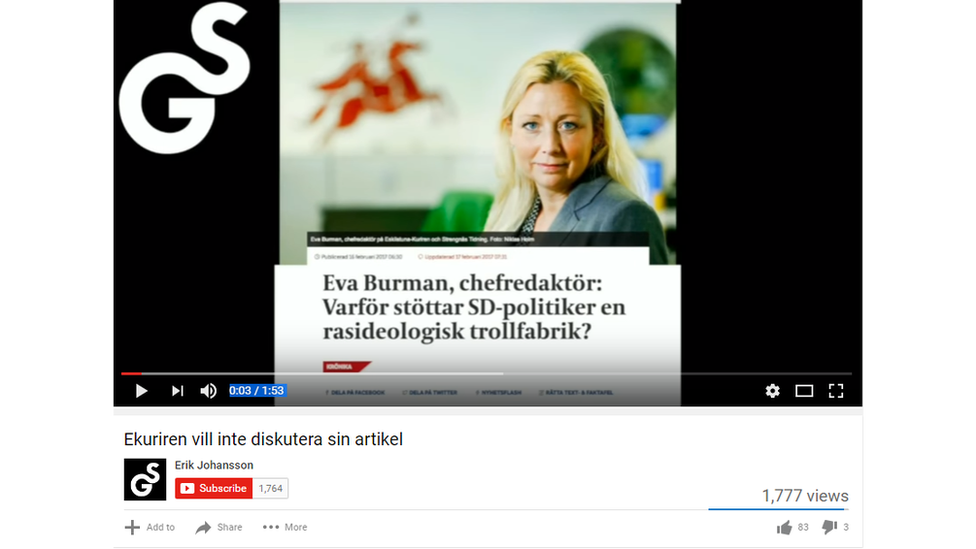The Swedish Trump fans who secretly record journalists
- Published

It's a website that describes itself as a citizens' initiative set up to ask the questions the mainstream media won't. Its critics say it's a "far-right trolling factory" whose sole purpose is to harass and intimidate.
"Granskning Sverige" roughly translates as "Examining Sweden". The site encourages volunteers to call journalists with a list of questions about their news coverage.
"I would say that the basic theme is xenophobic, they don't like immigrants," says Mathias Stahle, an investigative journalist for the Eskilstuna-Kuriren newspaper.
"They would like to read more positive things about Donald Trump, they would like to see positive stories about modern Russia and they want to have positive views of neo-Nazis."
Unbeknownst to the journalists being called, the conversations are recorded, edited and posted online on the website as well as the YouTube page of Erik Johansson, the administrator of the website.
One example of such a conversation was with Eva Burman - a colleague of Mathias Stahle's and Eskilstuna-Kuriren's editor-in-chief. The caller introduced himself as "Janne", and asked her why a story about an attack on a security guard didn't mention that a foreigner was allegedly behind the assault.
"The truth has to get out there," the caller says, according to an extract of the conversation, external published on the newspaper website. "Janne" blames Moroccan street children for the attack, although police are certain it was a local gang of youths. As the caller continues to make his case, Burman gets frustrated until she eventually snaps: "That is called racism."
The conversation - which lasted more than 20 minutes - was edited down to three minutes, and published on YouTube with the headline "Editor in chief calls citizen racist".

Conversations with journalists are secretly recorded and published online by Granskning Sverige
After hearing of Swedish journalists targeted by the callers, Stahle went undercover. He created a fake social media profile and signed up to several right-wing forums. He then contacted Granskning Sverige to offer his services as volunteer to call and record conversations with journalists.
He tells Trending that the offer was accepted almost immediately and he was told he could make money out of it - around $100 for every edited call that got over 3,000 hits online.
He says he was told that he needed to keep his identity secret and that any phone calls were to be edited to make them sound dramatic before being uploaded.

Trending radio
Hear this story in full on the BBC World Service, or download our podcast

BBC Trending approached Granskning Sverige administrators and received a reply from Erik Johansson who directed us towards a recording of an interview he had done with Stahle. In the interview, Johansson - which is an alias - insisted that what he does is no different from the secret recording techniques used by traditional journalists when a direct approach for an interview has failed.
One obvious difference though is that traditional journalistic ethics - like those practised by the BBC - usually require that the person who's been recorded is given a chance to reply before anything is published.
Johansson says that he's doing nothing wrong and that he's simply trying to persuade the media and others to present a more balanced picture of modern Sweden. Mathias Stahle, though, isn't convinced.
"I find what they do appalling," he says, "because they so obviously have a political agenda of their own which they want to communicate to the rest of the world by making these fake interviews."
And it's not just journalists who are being cold-called by the website.
Martin Kragh, head of the Russia and Eurasia Programme at the Swedish Institute of International Affairs published a report in January alleging that Russia was involved in a misinformation campaign aimed at influencing Sweden's relationship with Nato.
The paper was well received amongst other academics and tallies with the views of many western security experts but there was also a furious backlash from people claiming he was the one spreading disinformation.

More from BBC Trending
Visit the Trending Facebook page, external

"For the last six weeks I've been harassed and threatened," Martin Kragh says. "There has been a cyber attack and also a spread of disinformation. If you Google my name you find a lot of terrible things they've written about me."
In the days after the report came out Martin says he was bombarded by calls.
"This is a person who calls, he won't reveal his name, he will call you repeatedly using secret phone numbers and then he edits the phone calls himself in a way that you have no control over." Martin says. "He will also call colleagues of yours, to ask questions to get personal information.
"This is in no way normal journalistic behaviour."
In his interview with Mathias, Erik Johansson denies that his website aims to intimidate people.
He says that he believes he is performing an important service by providing an alternative view to that put forward by "mainstream media".
But he can no longer do so from behind a cloak of anonymity. Recently, the Swedish newspaper Expressen outed the man calling himself Erik Johansson as Fabian Fjalling, a 48-year-old from Torslanda near Gothenburg.
Next story: Are food bloggers fuelling racist stereotypes?

An Asian-American photographer says some digital foodies are playing into racist stereotypes about ethnic dishes. READ MORE
You can follow BBC Trending on Twitter @BBCtrending, external, and find us on Facebook, external. All our stories are at bbc.com/trending.